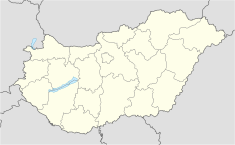Buda castle
| Buda Castle | |
|---|---|

Buda Castle Ariel view with Matthias Church
|
|
| Location | Budapest, Hungary |
| Coordinates | 47°29′46″N 19°02′23″E / 47.49611°N 19.03972°ECoordinates: 47°29′46″N 19°02′23″E / 47.49611°N 19.03972°E |
| Area | 4.73 km2 (1.8 sq mi) |
| Built | 14–20th century |
| Architect | Jean Nicolas Jadot, Miklós Ybl, Alajos Hauszmann |
| Architectural style(s) | Medieval, Baroque, Baroque Revival, Modernist |
| Official name: Budapest, including the Banks of the Danube, the Buda Castle Quarter and Andrássy Avenue | |
| Type | Cultural |
| Criteria | ii, iv |
| Designated | 1987 (11th session) |
| Reference no. | 400 |
| State Party |
|
| Region | Hungary |
Buda Castle (Hungarian: Budavári Palota, German: Burgpalast, Turkish: Budin Kalesi or Kızılhisar) is the historical castle and palace complex of the Hungarian kings in Budapest, and was first completed in 1265. In the past, it has been called Royal Palace (Hungarian: Királyi-palota) and Royal Castle (Hungarian: Királyi Vár, German: Königliche Burg).
Buda Castle was built on the southern tip of Castle Hill, bounded on the north by what is known as the Castle District (Várnegyed), which is famous for its Medieval, Baroque, and 19th-century houses, churches, and public buildings. It is linked to Clark Ádám Square and the Széchenyi Chain Bridge by the Castle Hill Funicular.
The castle is a part of the Budapest World Heritage Site, which was declared a Heritage Site in 1987.
The first royal residence on the Castle Hill was built by King Béla IV of Hungary between 1247 and 1265. It is uncertain whether it was situated on the southern tip of the hill or on the northern elevation, near the Kammerhof.
The oldest part of the present-day palace was built in the 14th century by Stephen, Duke of Slavonia, who was the younger brother of King Louis I of Hungary. Only the foundations remain of the castle keep, which was known as Stephen's Tower (Hungarian: István-torony). The Gothic palace of King Louis I was arranged around a narrow courtyard next to the keep.
...
Wikipedia

